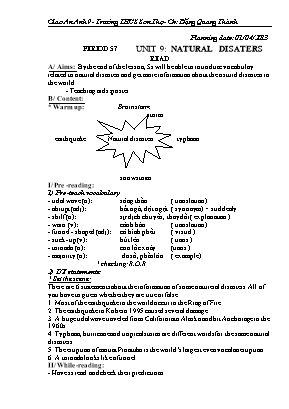Giáo án Tiếng Anh 9 Period 57 Unit 9: Natural disaters - Read
Bạn đang xem tài liệu "Giáo án Tiếng Anh 9 Period 57 Unit 9: Natural disaters - Read", để tải tài liệu gốc về máy bạn click vào nút DOWNLOAD ở trên

Planning date: 01 /04/2013 Period 57 Unit 9: Natural disaters Read A/ Aims: By the end of the lesson, Ss will be able to introduce vocabulary related to natural disasters and get more information about the nstural disasters in the world. - Teaching aids: poster B/ Content: * Warm up: Brainstorm storm earthquake Natural disasters typhoon snowstorm I/ Pre -reading: 1) Pre -teach vocabulary: - tidal wave (n): sóng thần ( translation ) - abrupt (adj): bất ngờ, đột ngột ( synonym ) = suddenly - shilf (n): sự dịch chuyển , thay đổi ( explanation ) - warn (v): cảnh báo ( translation ) - funnel - shaped (adj): có hình phểu ( visual ) - suck- up (v): hút lên ( trans ) - tornado (n): cơn lốc xoáy (trans ) - majority (n): đa số, phần lớn ( example ) * checking: R.O.R 2) T/F statements: * Set the scene: There are 6 statements about the information of some natureral disasters. All of you have to guess whether they are true or false. 1. Most of the earthquake in the world occur in the Ring of Fire. 2. The earthquake in Kobe in 1995 caused several damage. 3. A huge tidal wave traveled from California to Alaska and hit Anchorage in the 1960s. 4. Typhoon, hurricane and tropical storm are different words for the same natural disasters. 5. The eruption of mount Pinatubo is the world’s largest even vocalno eruption. 6. A tornado looks like a funnel. II/ While -reading: - Have ss read and check their predictions. * Answer key: 1. T 2. T 3. F ( a huge tidal wave traveled from Alaska to California ) 4. T 5. F ( The eruption of mount Pintubo is the world’s largest vocalnic eruption in more than 3 years ). 6.T * Compelte the sentences- p79. - Have Ss work in pairs and fill in the missing words. * Answer: 1. ....................... occur around the Pacific Rim. 2. ..................... people were killed when homes, office block and high ways collapsed. 3. ................... there is an erupt shilf in the underwater movement of the Earth. 4. .................... a cyclone. 5. ..................... the word typhoon. 6. ....................... passed over land below a thunderstorm and suck up anything that is in the path. III/ Post- reading: - Ss work in groups and answer the questions below. 1. Why do people call the Pacific Rim “ Ring of Fire”? 2. What will happen when there is an abrupt shilf in the underwater movement of the Earth? 3. What does “typhoon” mean? 4. Can we predic a vocalno? * Answer key: 1. Because ninety percent of earthquakes occur around the Pacific Rim. 2. Tidal waves. 3. The word “typhoon” means “big wind”. 4. Yes, we can. IV/ Homework: - Learn by heart vocabulary. - Do homework in work book. - Prepare for writing lesson.
Tài liệu đính kèm:
 Ls 4.doc
Ls 4.doc





